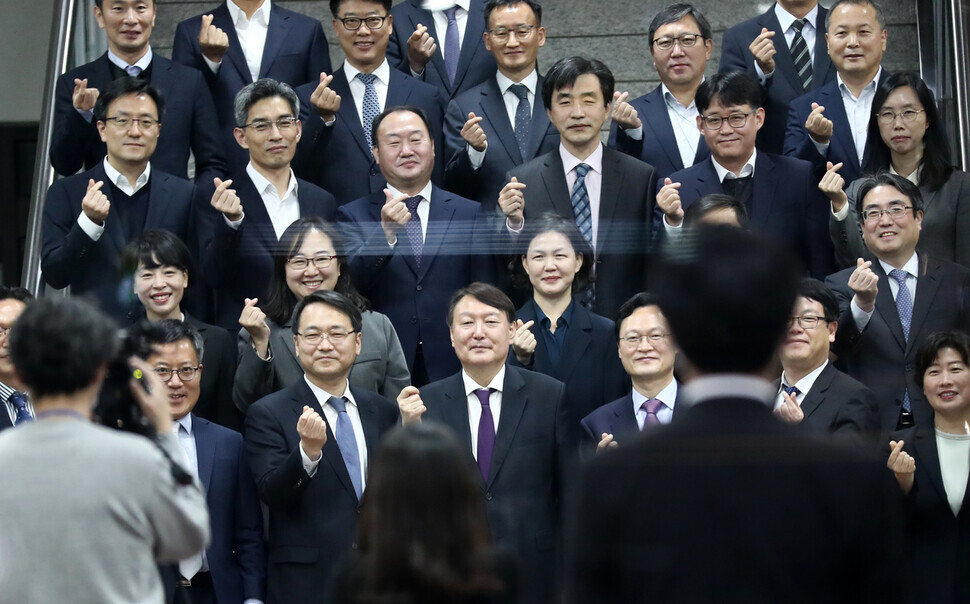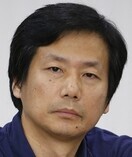hankyoreh
Links to other country sites 다른 나라 사이트 링크
[Column] The greed for power and lack of self-reflection evident in prosecutors’ online posts

A controversy has been raging over a so-called “posting relay” by prosecutors critical of Minister of Justice Choo Mi-ae. As I read the posts from prosecutors that were reported on in the media, I found myself asking a question: if the 300 or so posts that were published are supposed to represent nearly 15% of the total number of prosecutors, why did I not really see anything that deviated from the format of uniformly sniping at Choo?
A separate message was posted on the prosecutors’ intranet by Lim Eun-jeong, a researcher with the Supreme Prosecutors’ Office (SPO) auditing research center who insisted that the prosecutors “have a lot of karma coming” and are “in need of reflection,” citing investigations that resulted in charges being dropped against former President Lee Myung-bak and a blind eye being turned even when footage of an alleged sexual assault showed the face of former Deputy Minister of Justice Kim Hak-eui. But it reportedly drew a flood or responses criticizing Lim for trying to “deflect the issue.” Why are the prosecutors’ tentacles always pointed squarely outside their own organization?
Let’s first consider the background. All of this started on Oct. 28, when Lee Hwan-woo, a prosecutor with the Jeju District Prosecutors’ Office, posted a message on the prosecutors’ intranet declaring prosecutorial reforms a “failure.” Lee denounced Choo for a “barrage of instances of [invoking] appointment, direction, and auditing authority without concealing her objective and desire.” In a Facebook message the next day, Choo wrote, “If people are ‘coming out’ in this way, then reforms are the only answer.” She also posted a link to an article alleging that Lee had used harsh investigation tactics against a suspect arrested for intimidation against a fellow prosecutor. This was followed by another intranet post by Choi Jae-man, a prosecutor with the Chuncheon District Prosecutors’ Office, under the title “Regarding the [Justice] Minister’s Social Media Posts.” The message included a veritable cornucopia of nearly 300 replies from prosecutors who announced themselves as also “coming out.”
Choo’s actions were not appropriate. She acted all too casually, giving the impression that she was “marking the coordinates” of one particular public prosecutor. To be fair, it falls within her rights as the “chief superintendent to supervise prosecutorial affairs” to question the meaning of a statement by a prosecutor subject to such allegations. But she should have handled things in a more serious, sophisticated, and official manner.
More troubling is the sort of “collective will” reflected in the prosecutors’ posts. The individual numbered messages seemed to smack of exulting over the opportunity after Choo was “called out.” “High-handedness, suppression, and terrorizing are not reforms,” one wrote. “The essence of this situation is a case of using the strongest power available through public authorities and the media to suppress people as soon as they share an opinion contrary to the will of those in power,” said another. “Democracy is about allowing the internal members of an organization to freely state their opinion,” a third argued. The prosecutors’ message attached the prosecutorial reform push for its oppressive nature and procedural inadequacies. The problem here is the conclusion that on that basis, the reforms Choo is currently pursuing are “not reforms.” That’s a stretch.
Responses typical of those in power trying to retain authorityThe responses from prosecutors are indicative of the typical attitude of members of any power organization that has been targeted for reforms: highlighting problems with the process rather than attempting to attack the reforms themselves head-on. The emphasis on and criticism of the process’s unilateral and high-handed aspects by those who hold vested interests turns all too often into a repudiation of and resistance to the reforms themselves. On the surface, they seem to be talking about “issues with the process and methods” -- but very often, this is rooted deep down in a resolute refusal to acknowledge and accept the reforms “as reforms” on that basis. Responses that talk about “using the strongest power available through public authorities and the media to suppress people” seem to offer the best illustration of this deep-seated desire to have the tail wagging the dog. Choo’s biggest misstep has been to give a resounding slap across the face of prosecutors who are on the verge of tears.
I obviously don’t want to believe that all of these replies from prosecutors are reflections of a powerful, concerted commitment to outright deny the legitimacy of reforms by finding faults with the methods. Should no one post to express the conviction that the process needs to be as justified as its aims? But that sort of response has been the toughest of all to find among the replies from prosecutors, which continue to pour forth as I write this. Finding any fingers pointed back in the direction of the prosecutors’ own organization has been like digging for T-Rex bones. We don’t even need to go looking as far as the Kim Hak-eui allegations. It’s rare to find a single prosecutor who shows backbone enough to raise issues with the harsh rhetoric and politicized actions of Prosecutor General Yoon Seok-youl, someone who declared that the “prosecutor general is not the justice minister’s subordinate.”
In a conversation with then President Roh Moo-hyun in 2003, prosecutors insistently repeated that “prosecutorial appointments should be left to the prosecutors.” Their world view -- their desire not to be subject to any kind of outside controls -- remains unchanged. And that’s exactly why we cannot afford to leave the prosecutorial institution as the citadel it is.

By Son Won-je, editorial writer
Please direct comments or questions to [english@hani.co.kr]

Editorial・opinion
![[Guest essay] Maybe Korea’s rapid population decline is an opportunity, not a crisis [Guest essay] Maybe Korea’s rapid population decline is an opportunity, not a crisis](https://flexible.img.hani.co.kr/flexible/normal/500/300/imgdb/original/2024/0430/9417144634983596.jpg) [Guest essay] Maybe Korea’s rapid population decline is an opportunity, not a crisis
[Guest essay] Maybe Korea’s rapid population decline is an opportunity, not a crisis![[Column] Can Yoon steer diplomacy with Russia, China back on track? [Column] Can Yoon steer diplomacy with Russia, China back on track?](https://flexible.img.hani.co.kr/flexible/normal/500/300/imgdb/original/2024/0430/1617144616798244.jpg) [Column] Can Yoon steer diplomacy with Russia, China back on track?
[Column] Can Yoon steer diplomacy with Russia, China back on track?- [Column] Season 2 of special prosecutor probe may be coming to Korea soon
- [Column] Park Geun-hye déjà vu in Yoon Suk-yeol
- [Editorial] New weight of N. Korea’s nuclear threats makes dialogue all the more urgent
- [Guest essay] The real reason Korea’s new right wants to dub Rhee a founding father
- [Column] ‘Choson’: Is it time we start referring to N. Korea in its own terms?
- [Editorial] Japan’s rewriting of history with Korea has gone too far
- [Column] The president’s questionable capacity for dialogue
- [Column] Are chaebol firms just pizza pies for families to divvy up as they please?
Most viewed articles
- 1Under conservative chief, Korea’s TRC brands teenage wartime massacre victims as traitors
- 2Months and months of overdue wages are pushing migrant workers in Korea into debt
- 3[Guest essay] Maybe Korea’s rapid population decline is an opportunity, not a crisis
- 4[Column] Can Yoon steer diplomacy with Russia, China back on track?
- 5First meeting between Yoon, Lee in 2 years ends without compromise or agreement
- 6After election rout, Yoon’s left with 3 choices for dealing with the opposition
- 7[Column] Behind factional animus of Korean politics, victim mentality festers
- 8‘We must say no’: Seoul defense chief on Korean, USFK involvement in hypothetical Taiwan crisis
- 9[Editorial] Japan’s removal of forced labor memorial tramples on remembrance, reflection and friends
- 10[Guest essay] A society in which old age becomes a burden